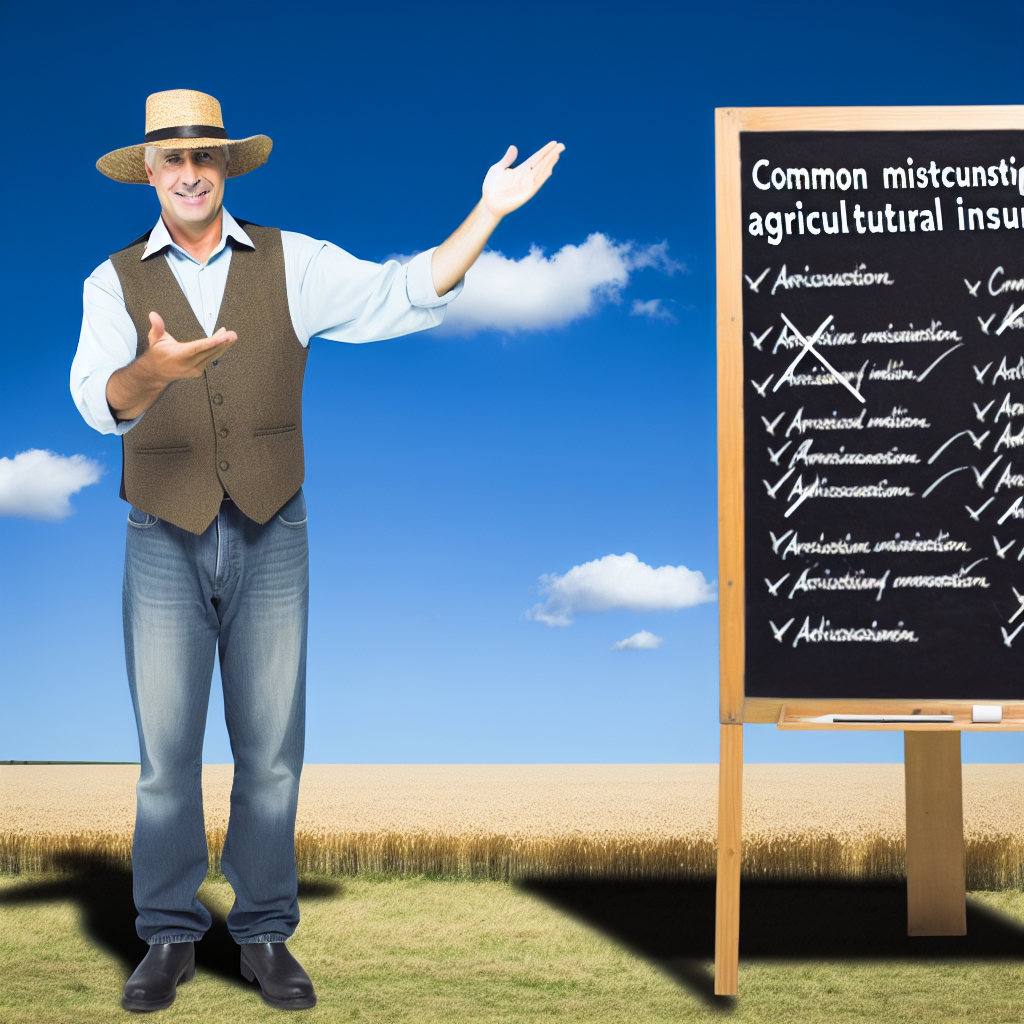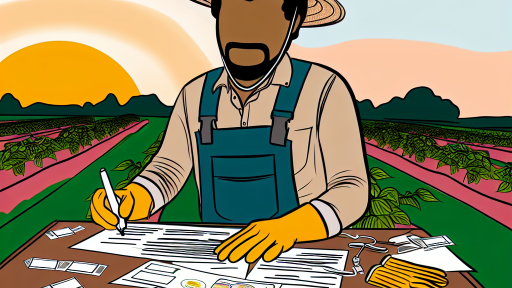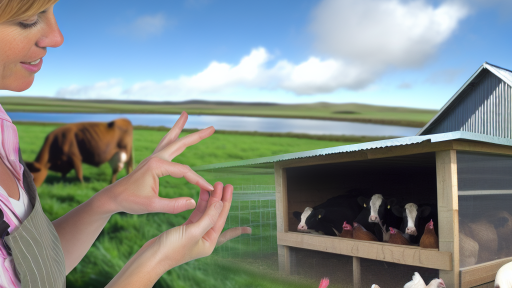Understanding the Basics of Agricultural Insurance
What Is Agricultural Insurance?
Agricultural insurance provides financial protection for farmers.
It covers losses due to natural disasters, pests, and diseases.
In addition, it can safeguard against market fluctuations.
Types of Agricultural Insurance Policies
There are various types of agricultural insurance policies available.
Crop insurance is the most common type.
This policy covers crops against unforeseen events.
Livestock insurance protects against the loss of animals.
Farm property insurance secures buildings and equipment.
Key Coverage Options
Understanding coverage options helps in choosing the right policy.
Policies often include loss of income coverage.
They may also cover additional expenses during losses.
Some policies offer coverage for soil erosion and water damage.
Who Needs Agricultural Insurance?
Farmers of all sizes can benefit from agricultural insurance.
Small farmers may find policies especially helpful.
However, large agricultural businesses also require protection.
Transform Your Agribusiness
Unlock your farm's potential with expert advice tailored to your needs. Get actionable steps that drive real results.
Get StartedCommon Misconceptions
Many misconceptions exist about agricultural insurance.
Some believe it only covers natural disasters.
In reality, it covers a range of risks including theft.
Others think it’s too expensive for small farmers.
However, numerous affordable options are available.
Choosing the Right Policy
Selecting the appropriate policy requires careful consideration.
Farmers should assess their unique needs and risks.
Consulting with an insurance agent can provide valuable insights.
Researching various options helps in making an informed decision.
Common Misconceptions About Agricultural Insurance Policies
Agricultural Insurance is Only for Large Farms
A common myth is that only large farms benefit from agricultural insurance.
However, this is far from the truth.
Many smaller farms also face significant risks.
They encounter challenges like drought, pests, and market fluctuations.
Thus, agricultural insurance is essential for them as well.
In fact, policymakers understand this need.
They have designed various insurance programs catering to small producers.
Understanding the Coverage Options
A wide range of coverage options is available for small farms.
These options include crop insurance and livestock coverage.
For instance, farmers can insure specific crops against natural disasters.
Similarly, livestock can be protected from diseases or mortality.
This kind of insurance helps manage the inherent risks in agriculture.
Benefits for Small Farmers
Access to agricultural insurance offers numerous advantages.
- It provides financial stability in times of crisis.
- It allows farmers to invest confidently in their operations.
- Additionally, it helps in maintaining credit and access to loans.
Moreover, small farmers can hedge against unpredictable events.
Hence, they can focus on productivity instead of uncertainties.
Showcase Your Farming Business
Publish your professional farming services profile on our blog for a one-time fee of $200 and reach a dedicated audience of farmers and agribusiness owners.
Publish Your ProfileUltimately, agricultural insurance proves beneficial across all farm sizes.
It plays a critical role in promoting sustainable agricultural practices.
Understanding Agricultural Insurance Policies
Myth: All Agricultural Insurance Policies are the Same
This is a common misconception among farmers and agricultural stakeholders.
In reality, agricultural insurance policies vary significantly.
Each type addresses different risks and operational needs.
Understanding these distinctions is crucial for effective risk management.
Diverse Coverage Options
Agricultural insurance includes various coverage types.
Crops, livestock, revenue, and more have specific policies.
For instance, crop insurance can be yield-based or revenue-based.
Farmers should choose policies based on their unique needs.
Policy Providers
Different insurance providers offer different policy features.
Companies like AgriSure and Farm Bureau provide unique options.
Additionally, policy terms can vary from provider to provider.
This affects premiums and claims processes.
Geographical Considerations
Your location influences the type of coverage available.
Certain regions may be more prone to specific risks.
For example, flood insurance is critical in flood-prone areas.
Thus, farmers should consider local conditions when selecting policies.
Tailored Solutions
Many providers offer customizable policies.
Farmers can tailor their insurance to match operational needs.
This customization allows for flexibility and precise coverage.
It can include options for additional coverage on certain risks.
Role of Optional Endorsements
Many policies offer optional endorsements for additional protection.
Endorsements can cover specific events not included in the base policy.
For example, drought endorsements provide extra security against water shortages.
Farmers should evaluate these options when choosing coverage.
Gain More Insights: Sustainable Farming Under Water Restrictions
Farming Insurance is a Waste of Money
Understanding the Value of Insurance
Many farmers believe farming insurance is an unnecessary expense.
This misconception overlooks the significant risk involved in agriculture.
Natural disasters, disease outbreaks, and market fluctuations can threaten crops and livestock.
Insurance provides a safety net against these unpredictable challenges.
Cost-Benefit Analysis
While premiums may seem costly, the potential losses without coverage can be devastating.
For example, a hailstorm can wipe out an entire crop overnight.
Without insurance, farmers may struggle to recover financially.
In contrast, having coverage can facilitate rebuilding efforts after a disaster.
Long-Term Financial Security
Investing in insurance contributes to long-term financial health.
It offers peace of mind, allowing farmers to focus on growing their operations.
Additionally, many insurance policies offer flexible payment options.
This adaptability helps farmers manage cash flow more effectively.
A Common Safety Net
Insurance acts as a common safety net across the farming community.
Showcase Your Farming Business
Publish your professional farming services profile on our blog for a one-time fee of $200 and reach a dedicated audience of farmers and agribusiness owners.
Publish Your ProfileIt encourages sustainable farming practices by reducing risk.
When farmers collectively invest in insurance, they contribute to a more robust agricultural sector.
Furthermore, insured farmers can bounce back faster during tough times.
Discover More: Challenges and Solutions in Food Safety Compliance for Farmers
Natural Disasters are the Only Covered Risks
Understanding the Scope of Coverage
Many people mistakenly believe agricultural insurance solely covers natural disasters.
This myth oversimplifies the range of risks these policies address.
In reality, agricultural insurance protects against various unpredictable events.
It includes risks from pests, diseases, and market fluctuations.
Diverse Risks Included in Agricultural Insurance
Farmers can face several challenges outside of natural disasters.
For instance, crop failure can stem from disease outbreaks.
Additionally, adverse weather conditions like drought can also affect yields.
Other factors like price volatility significantly impact farmers’ income.
Insurance policies typically address these diverse risks through various plans.
Different Types of Agricultural Insurance Policies
Farmers have access to multiple insurance products tailored to their needs.
- Multi-Peril Crop Insurance covers a range of risks.
- Yield Protection ensures income despite lower yields.
- Revenue Protection safeguards against price drops and poor yield.
Each policy protects against specific risks, demonstrating broad coverage.
The Importance of Understanding Policies
Understanding the details of a policy is crucial for farmers.
They should be aware of what risks are covered and under what conditions.
This knowledge helps in selecting the right policy for their situation.
Proper comprehension allows for better risk management and financial planning.
Implications of Agricultural Insurance Coverage
Agricultural insurance does much more than cover natural disasters.
Farmers benefit from understanding the numerous risks included in their policies.
By breaking down these misconceptions, farmers can make informed choices.
Gain More Insights: Understanding Organic Farming Standards
Claiming Agricultural Insurance is Too Complicated
Understanding the Process
Many farmers believe that claiming agricultural insurance is overly complicated.
However, the process is designed to be straightforward and user-friendly.
Most insurance companies provide step-by-step guides to assist policyholders.
Moreover, agents are available to help navigate any complexities.
Thus, farmers can feel confident when filing a claim.
Steps to File a Claim
The first step in filing a claim is to notify your insurance provider.
Next, gather all necessary documents related to the incident.
These documents may include farming records and loss assessments.
After that, fill out the claim form accurately and completely.
Finally, submit your claim along with required documents to your insurer.
Helpful Resources
Insurance providers often have online resources for policyholders.
These resources include FAQs, video tutorials, and live chat support.
Additionally, local agricultural extension offices might offer guidance.
Farmers can attend workshops to learn more about the claims process.
Ultimately, these resources help demystify agricultural insurance claims.
Common Pitfalls to Avoid
Farmers often make mistakes that delay their claims.
- One common mistake is waiting too long to report a loss.
- Another issue arises from incomplete documentation.
- Inaccurate claim forms can also lead to complications.
By being diligent and thorough, farmers can avoid these pitfalls.
Showcase Your Farming Business
Publish your professional farming services profile on our blog for a one-time fee of $200 and reach a dedicated audience of farmers and agribusiness owners.
Publish Your ProfileAs a result, the claims experience will be smoother and more efficient.
Success Stories
Many farmers have successfully navigated the claims process.
For instance, Emily from Green Valley Farms faced a severe drought.
She quickly filed her claim and provided all necessary information.
Within weeks, her claim was processed, and she received her payout.
This allowed her to manage her farm expenses effectively.
Understanding the Claims Process
In summary, the perception that claiming agricultural insurance is too complicated is often unfounded.
With proper understanding and support, most farmers can navigate the system with ease.
Utilizing available resources will help make the process efficient and less stressful.
Learn More: Compliance Tips for Farm Labor Laws

Insurance Companies Always Deny Claims
Understanding the Perception
Many people believe that insurance companies deny claims as a common practice.
This perception is largely rooted in misunderstanding and negative experiences.
However, the reality is much more nuanced.
Investigation Process
Insurance firms conduct thorough investigations before approving or denying claims.
They need to assess the legitimacy and details surrounding each claim.
Many factors come into play during this process.
Common Reasons for Denials
Not all claims are denied arbitrarily.
Specific reasons often lead to denial.
- Inadequate documentation might be a reason.
- Claims can be denied due to policy exclusions.
- Occasional instances of fraudulent claims lead to rejection.
Positive Outcomes
Insurance companies do approve a significant number of claims as well.
Industry statistics show a high approval rate for legitimate claims.
This indicates that many farmers receive the support they need.
Importance of Understanding Policies
Understanding the details of agricultural insurance policies is crucial.
Farmers should read their policies carefully.
This knowledge empowers them to submit valid claims confidently.
Building a Relationship with Insurers
Establishing a good relationship with the insurer can be beneficial.
This relationship fosters open communication about expectations and coverage.
Such dialogue helps in resolving issues before they escalate.
The Importance of Understanding Policy Exclusions and Limitations
Defining Policy Exclusions
Policy exclusions refer to specific situations that are not covered by an agricultural insurance policy.
Farmers often overlook these exclusions during the purchasing process.
Consequently, unaware farmers may face unexpected financial burdens.
Recognizing Coverage Limitations
Coverage limitations specify the extent of the policy’s protection.
Many policies have caps on payouts for certain types of losses.
These limitations can significantly impact a farmer’s financial recovery.
Common Misconceptions
One misconception is that all damages are covered under any agricultural insurance policy.
Another common belief is that exclusions are rarely enforced.
In reality, insurers closely adhere to stated exclusions during claims processing.
Importance of Thorough Review
A thorough review of policy details is crucial before signing.
Farmers should ask their agents detailed questions about coverage exclusions.
Understanding these aspects can prevent future disputes with the insurer.
Seeking Expert Advice
Consulting with insurance professionals can illuminate complex policy terms.
Showcase Your Farming Business
Publish your professional farming services profile on our blog for a one-time fee of $200 and reach a dedicated audience of farmers and agribusiness owners.
Publish Your ProfileExperts can help farmers tailor policies to suit individual needs.
Ultimately, informed decisions lead to better financial security.
Clearing Up Misconceptions to Make Informed Decisions
Understanding Agricultural Insurance Policies
Agricultural insurance policies are crucial for farmers.
They provide financial protection against unforeseen events.
However, many misconceptions surround these policies.
It’s vital to understand their true nature to make informed choices.
Myths and Realities
One common myth is that agricultural insurance is too expensive.
While costs can vary, many affordable options exist.
Farmers must assess their specific needs to find suitable coverage.
Another misconception is that insurance covers all types of loss.
In reality, policies often have exclusions.
Understanding these exclusions helps farmers avoid surprises during claims.
Many believe that only large farms can benefit from insurance.
This is not true, as small farms also gain essential protection.
Insurance can stabilize income regardless of farm size.
Some think handling claims is too complicated.
In fact, most insurance companies provide support throughout the process.
Clear communication simplifies the claims experience.
Finding the Right Coverage
Choosing the appropriate agriculture insurance requires research.
Farmers should compare multiple policies before making a decision.
Consulting with an expert can also provide valuable insights.
Additionally, assessing specific risks is crucial.
Each farm faces unique challenges based on its location and crops.
Tailoring coverage to those risks ensures adequate protection.
Lastly, farmers should review their policies regularly.
Changes in the environment or market may impact their coverage needs.
Regular assessments help keep insurance aligned with current circumstances.
By debunking these misconceptions, farmers can approach agricultural insurance with confidence.
They can choose effective policies that suit their needs and protect their livelihoods.
Additional Resources
Agricultural insurance: The antidote to many economic illnesses




